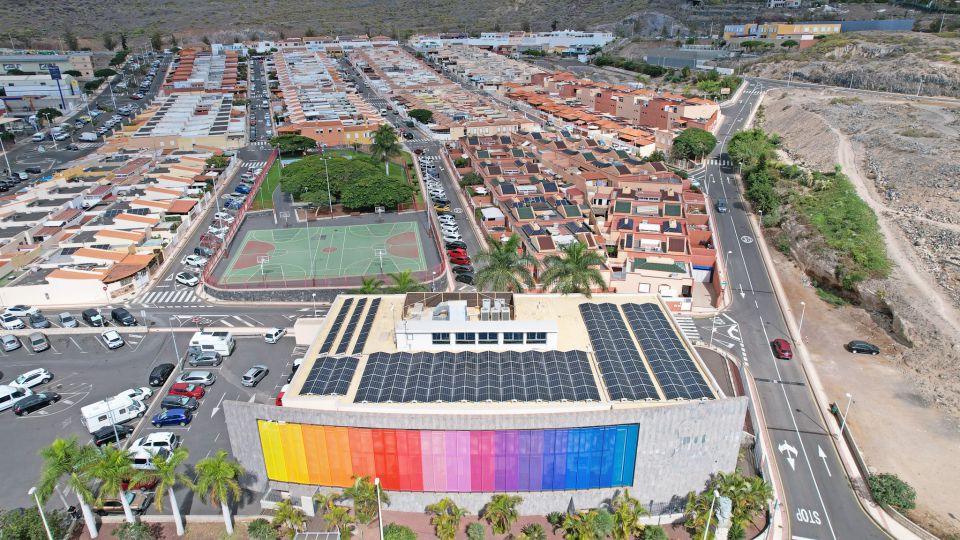Adeje Town Hall has achieved a major milestones with the Adeje Verde project. The goal was to ensure that the largest sustainable energy community in the Canary Islands would become operational and it now serves over 100 families, and various small businesses in the Las Torres area.
Specifically, this green community produces 160 MWh of electricity per year, benefiting a total of 103 families, a pharmacy, and a restaurant. All of them receive a share of this energy, allowing them to reduce their electricity bills each month. Furthermore, the community also supplies energy to the Adeje Municipal School of Music and the Local Police building, which translates into further savings for the council. Overall, it is estimated that the total savings for all participants in this pioneering project amount to around €16,000 annually. While the amounts may not seem significant when divided among all participants, this is only the first step in a project that, when fully operational, could exponentially multiply these benefits.
As recently acknowledged by the Adeje mayor, José Miguel Rodríguez Fraga, “the economic benefits are not the only goal of the Adeje Verde project. We want families and as many people as possible to benefit financially, but we are also focused on sustainability and respect for the environment.” In fact, it has been calculated that the 160 MWh produced will prevent the emission of 80 tonnes of CO2 into the atmosphere from the Granadilla power station. To be even more scientific, and considering data from the Aquae Foundation, which estimates that a tree absorbs between 10 and 30 kilograms of CO2 per year, one could deduce that the energy produced at the Adeje photovoltaic plant is equivalent to planting between 266 and 800 trees annually in the municipality. This is similar to what the council has already accomplished in the Central Parque.
Thanks to the annual sunshine levels in Adeje, the photovoltaic plant will produce all the energy needed for its manufacture, installation, and future dismantling ("energy payback") in less than a year, leaving a minimum of 30 years ahead for the plant to continue generating electricity.
The mayor, along with the project’s technical manager, Ricardo Guerrero, recently met to evaluate the milestones of the project and highlighted the importance of the fact that “the installation and development of all the technical aspects on the ground have been carried out with local labour and resources, contributing to the circular economy.” Guerrero explained that the photovoltaic plant, mainly installed on the roof of the Municipal School of Music and other public buildings, covers approximately 800 square metres and has also been equipped with a weather station, field cameras, and is prepared for future synchronisation with the electric water heaters in the area.
The Adeje Verde project has been backed by Adeje Town Hall and the University of La Laguna following a partnership deal signed in 2019, which also involved companies from the electricity sector, including local installers. The initial idea was to maximise the solar resources available in the municipality to generate as much electricity as possible on-site and share it between producers and consumers.
To coordinate all of the above, the University of La Laguna promoted the establishment of the technology-based company EnergyRIS, a spin-off of the University of La Laguna, to ensure that all studies and technological and regulatory challenges associated with the project could be addressed with certainty. Once it was confirmed at the end of 2021 that the project was feasible, the Adeje Verde (AV) brand was created, and AV Green Europe was established, employing local workers and aiming to promote the advantages of collective self-consumption, starting with the recruitment of consumers to participate in the 99 kWp self-consumption project being developed as a pilot project at the Municipal School of Music in Adeje.
Having successfully launched the largest collective self-consumption initiative in the islands, Adeje Verde has already outlined a plan for further progress that will be announced very soon. Building on the initial experience in Las Torres and the grants obtained, it is projected that the energy produced by these initiatives will yield annual savings of €3.4 million for residents and businesses in the municipality, while avoiding the emission of nearly 10,000 tonnes of CO2 into the atmosphere each year. Additionally, the batteries will allow some of the energy produced to be consumed during peak pricing hours, generating further savings and preventing a significant portion of the generated energy from being lost due to insufficient consumption capacity or improperly compensated by suppliers.
